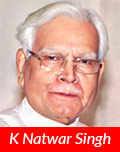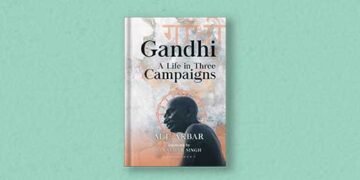 GANDHI’S statement in court is among the greatest speeches of the 20th century. It made global news.
GANDHI’S statement in court is among the greatest speeches of the 20th century. It made global news.
The world was familiar with Gandhi having covered his stellar nonviolent upsurge in South Africa, but rarely was international media as entranced, or indeed as emotionally drained, as during the course of the salt satyagraha in 1930. Gandhi turned a pinch of salt into the paramount symbol of British economic exploitation, of fiscal oppression against the poorest of the poor. The British recognised the steel; they also glimpsed the velvet.
Gandhi had a delightful sense of humour. Let me recall two instances both from 1931 well known to those who have read Gandhi but nevertheless stories that should be widely known. A British journalist in London asked Gandhi what the thought of Western civilisation. Deadpan, Gandhi replied that it would be a good idea. One sentence conveyed as much as a tome.
The second is about King George V, who was reluctant to invite Gandhi to a reception at Buckingham Palace for reason of protocol: a loincloth was not the British Emperor’s preferred idea of correct attire in front of His Majesty.
Gandhi was equally determined to dress in the manner of his principles, the people of India. The India Office intervened. Gandhi was invited. He made no sartorial concession. After the reception while he was getting into the car, a journalist asked what the king had to say about the loincloth. Gandhi replied, again deadpan, that clothing was not an issue since His majesty was wearing enough clothes for both of them.
While Gandhiji received unprecedented adulation From the Indian masses, his views did not always get the acquiescence of some of his great peers. One gripping part of this book is the passage of correspondence between Gandhi and the revered nation poet Rabindranath Tagore over the role of the spinning wheel in India’s economic vision. Tagore was critical of some aspects of ‘Gandhism’ in a long essay in the Modern Review issue of September 1925 on the charkha as a central icon:
‘It is extremely distasteful to me to have to differ from Mahatma Gandhi in regard to any matter of principle or method. Not that, from a higher standpoint, there is anything wrong in so doing; but my heart shrinks from it. For what could be a greater joy than to join hands in the field of work with one for whom one has such love and reverence? Nothing is more wonderful to me than Mahatmaji’s great moral personality. In him divine providence has given us a burning thunderbolt of Shakti. May this Shakti give power to India – not overwhelm her – that is my prayer.
The difference in our standpoints and temperaments has made the Mahatma look upon Rammohun Roy As a pygmy – while I revere him as a giant. The same difference makes the Mahatma’s field of work one which my conscience cannot accept as its own….. How often have any personal feelings of regard strongly urged me to accept at Mahatma Gandhi’s hands my enlistment as a follower of the charkha cult, but as often have any reason and conscience restrained me, lest I should be a party to the raising of the charkha to a higher place than is its due, thereby distracting attention from other more important factors in our task of all-around reconstruction.
I feel sure that Mahatma himself will not fail to understand me and keep for me the same forbearance which he has always had…. A man like that Mahatma may succeed in getting some of our countrymen to take an interest in this kind of uninspiring nature for a time because of their faith in his personal greatness of soul. To obey him is for them an end in itself. To me it seems that such a state of mind is not helpful for the attainment of Swaraj.’
But as is equally evident, Tagore recognised Gandhi’s indispensable place in the litany of India’s freedom struggle. Over the years, on both sides, respect matured to admiration and even affection. One of the most moving episodes recounted in this book is Tagore anguish and then overwhelming relief when Gandhi survived in 1932 the fast unto death in Pune.

































